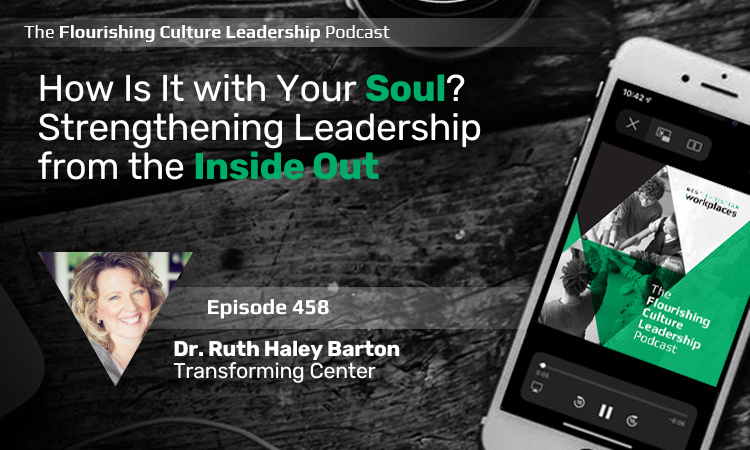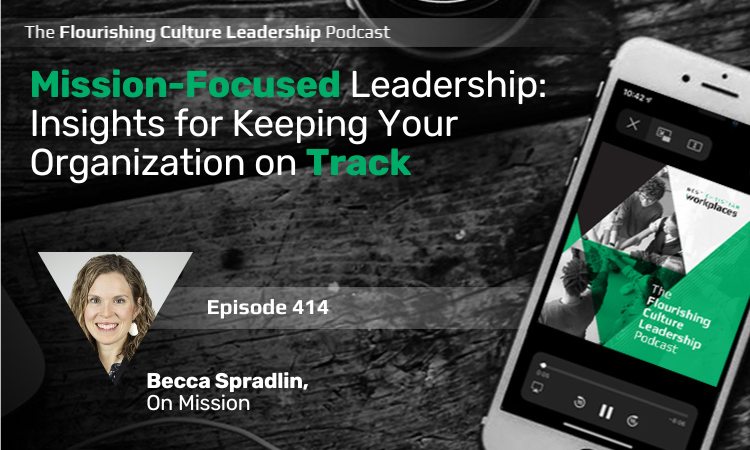Join us for this encore episode with Ruth Haley Barton, founder of the Transforming Center, as she explores the critical question every leader must face: 'How is it with your soul?' Discover why leaders who neglect their inner spiritual life risk losing themselves, and how cultivating spiritual disciplines can transform both your leadership and your organization's culture.
Listen to the Audio
Listen in Apple Podcasts | Listen in Spotify | Listen in YouTube Music
In this episode:
About Ruth Haley Barton
- Author of "Strengthening the Soul of Your Leadership: Seeking God in the Crucible" (expanded edition) (01:05)
- Founder of the Transforming Center
- Spiritual director, teacher, and retreat leader (00:51)
- Mother of three daughters, grandmother of nine (02:02)
- Recently lost her mother on Christmas Eve (02:15)
Book Updates (New Expanded Edition)
- Group guide included - designed for elder teams, Christian boards, leadership groups (02:29)
- Creates "soul-stirring experiences" and "soul-ish conversations" among leaders (03:10)
- "How Is It with Your Soul?" assessment - 15 questions for gentle self-reflection at the soul level (03:28)
- Recognizes that leaders typically process the book together rather than alone (02:31)
The Central Question: "How Is It with Your Soul?"
- Core question from Wesleyan tradition - used in "Jesus bands" (04:24)
- Addresses Jesus' warning about gaining the world but losing your soul (04:54)
- Requires honest self-assessment before God (06:04)
- Foundation for authentic leadership transformation
Warning Signs: When Leaders Lose Their Soul
Individual Leader Symptoms:
- Disconnection from God - busy doing things for God but spiritually empty inside (07:31)
- Loss of intimacy with God for personal spiritual nourishment (07:33)
- Feeling tired of helping others experience God (05:13)
- Desire to escape or run away from responsibilities (07:42)
- Disillusionment and disappointment with current life (07:47)
- Good at public prayer but stopped praying personally (07:56)
- Dreams of having a different life (07:43)
Organizational Symptoms:
- Drivenness - working harder and harder for results (08:10)
- People cannot bring their souls to work environment (08:16)
- No one can admit exhaustion (08:19)
- Operating by secular business principles instead of spiritual discernment (08:24)
- Strategic planning dominates over seeking God's will (08:32)
- People treated as cogs rather than human beings (08:37)
- Lack of integrity - disconnect between public presentation and private reality (08:41)
- Organization functions no differently than secular environments (09:02)
The Danger of "I've Got This Under Control"
- Self-deception is a major risk for all leaders (09:47)
- Many leaders unable to be honest about their internal state (09:53)
- Risk of "derailing without knowing" until it's too late (10:12)
- Hits the wall, makes bad decisions, or experiences failure before recognizing the problem (10:17)
Moses as Leadership Model
- Ruth's journey: First studied Elijah (wilderness experience), then Moses (active leadership) (11:00)
- Moses chosen because he was a leader who suffered (11:39)
- Scripture honestly describes the difficulties of his leadership (11:44)
- Moses experienced: difficult people, risks, disillusionment, loneliness, feeling abandoned by God (11:48)
- Key question: "How does a leader remain faithful to calling until the end of life?" (12:13)
- Desire to be a "marathoner, not a sprinter" in leadership (12:25)
Spiritual Practices for Leaders
Leadership as Intercession
- Moses functioned as intercessor - standing between God and people (13:07)
- Being in God's presence on behalf of those being led (13:42)
- Taking disillusionment to God rather than fighting with people
- Guided prayer exercise: Holding people/situations literally in hands before God (13:56)
- Restful approach - God brings people to mind, leader holds them in God's presence (14:18)
- Less working hard, more trusting God (14:37)
- Creates meaningful, tear-flowing experiences for leaders (15:04)
The Vision for Soul-Healthy Leadership
For the Leader:
- Make it for the long haul with soul intact (16:05)
- Avoid flaming out, burning out, or moral failure (16:07)
- Remain faithful and fruitful until God calls them home (16:12)
- Look back and say "I loved those You gave me well, until the end" (like Jesus) (16:36)
- Experience deep spirituality and regular renewal (17:13)
- Stay connected to God who loves them (17:07)
For Colleagues/Organizations:
- People who have been loved well and guided wisely (17:19)
- Valued for who they are, not used as cogs (17:23)
- Colleagues become better people and grow in the Lord (17:29)
- Experience of being developed rather than depleted
- Culture of transformation rather than drivenness
Most Important vs. Most Overlooked
Most Important:
- God is the one who strengthens souls (Psalm 138) (18:32)
- Staying in close communion with God (18:44)
- Being open to God's transforming work (18:50)
- Understanding leadership as ongoing transformation (18:54)
- "The best thing you bring to leadership is your own transforming self" (19:00)
- Cultivating belongingness to God above all else (19:20)
Most Overlooked:
- Integration of spirituality with full humanity (19:34)
- Caring for bodies, emotional lives, broken areas as part of spirituality (19:54)
- Discernment vs. strategic planning (20:13)
- Many Christian leaders have adopted secular principles without critique (20:32)
- Lost sight of discernment as heart of spiritual leadership (20:38)
- Need for "resurgence of interest" in discerning and doing God's will (20:53)
Discernment in Leadership
Key Elements:
- Commitment to discernment as defining characteristic of leadership (21:25)
- Cultivating friendship with God (21:33)
- Ability to notice everything without judging (21:50)
- Not tied to grandiosity - willing to look foolish by secular standards (21:55)
- Deep belief that God's will is best under any circumstances (22:29)
- God's wisdom often strategic in different ways than human intellect (22:19)
Other Key Practices:
- Prayer for wisdom (21:38)
- Prayer of quiet trust (21:39)
- Prayer of indifference - asking God to make us indifferent to anything but God's will (21:41)
- Commitment to discernment as habit and practice
- Cultivating friendship with God
Organizational Transformation Through Discernment:
- Leaders begin personal transformation journey (23:08)
- Share discernment practices with leadership team (23:29)
- Others become enlivened to pursue transformation (23:36)
- Corporate discernment - done by everyone together (23:44)
- Leadership meetings become peaceful, exciting, unified (23:56)
- From polarized to unity through commitment to God's will (24:43)
- Experience of God showing up in leadership meetings (24:22)
Moses' Journey: Learning from Failure
The Starting Point:
- Moses began by seeing his false self - undisciplined, out-of-control anger
Had to recognize he was ineffective as leader first (25:38)
- Killed Egyptian due to uncontrolled anger (25:49)
- Ran into wilderness/solitude where God did purifying work (26:01)
- Heard God calling him back to place of greatest pain (26:07)
The Pattern:
- Leadership often begins with honest assessment of who we are (26:44)
- Moving beyond brokenness to place of healing (26:49)
- God bringing something truer through our lives (26:54)
- Soul experience - where God's Spirit witnesses with our spirit (26:59)
- Happens at the soul level, not just intellectual level (27:07)
Final Key Insights
Right Relationship with Vision:
- Visions can become more important than relationship with God (27:45)
- The Promised Land is the nearness of God - we already have this (27:58)
- Cultivating nearness with God is leader's greatest good (26:03)
- Vision may be good and God-given, but relationship with God matters most (28:19)
- Moses' example: "If you don't go with us, do not lead us up from here" (26:24)
- Danger when vision becomes more important than relationship with God (28:33)
Core Principles:
- The best thing you bring to leadership is your transforming self (28:51)
- Spiritual leadership is fundamentally different from secular leadership (29:00)
- Transformation must be ongoing, not a one-time event
- Leaders need each other for soul-level conversations and support
- Integration of full humanity with spirituality
- Discernment over strategic planning as leadership foundation

Read the Transcript
Read a complete, word-for-word transcript of the episode
FOLLOW OUR HOST
Follow our Host, Al Lopus, on LinkedIn & Twitter.
Email our host at al@workplaces.org
 Best Christian Workplaces
:
September, 01 2025
Best Christian Workplaces
:
September, 01 2025

